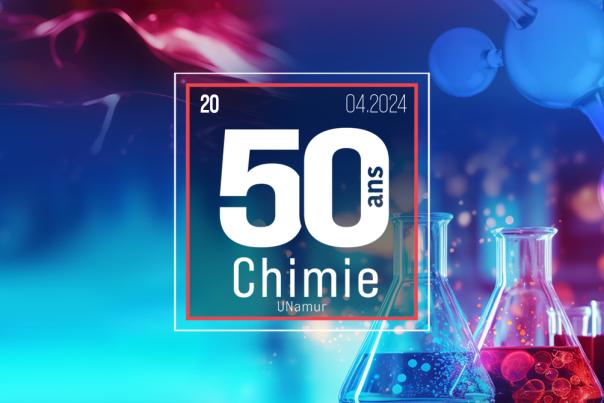The Department of Chemistry at UNamur is at the forefront of scientific research, exploring the frontiers of knowledge to solve some of the most pressing challenges of our time. State-of-the-art laboratories, led by world-renowned researchers, are dedicated to a wide range of fields, from organic and materials chemistry to analytical and theoretical chemistry. Interdisciplinary collaborations and international partnerships constantly enrich our understanding of matter and open up new avenues to innovation.
Research conducted within the Department has tangible repercussions on society:
- It contributes to innovation in the fields of healthcare and energy.
- They offer solutions for depollution, energy storage and health.
- They train researchers for the pharmaceutical and chemical industries.
- They provide solutions to corrosion and medical materials.
- They improve teaching practices in chemistry, training the scientists of tomorrow.
Find out more about the five Specialized Units, each focused on specific areas of chemistry and dedicated to solving pressing societal challenges:
- Healthcare and energy: Unit of Theoretical and Structural Physical Chemistry (UCPTS)
Research areas: These are aimed at characterizing structural and electronic properties of (macro)molecules. Researchers apply and develop a wide range of theoretical methods: quantum mechanics, molecular mechanics, hybrid QM/MM methods, and statistical mechanics. In a complementary way, the Research Unit is developing expertise in the field of structure determination and characterization of (macro)molecules through experimental physico-chemical methods (crystallography, calorimetric analyses, bio-spectroscopies).
Specificities: Strongly based on an interdisciplinary approach, research within the UCPTS is characterized by a complementarity of experimental and theoretical approaches. The ability to carry out numerical simulations using the latest theoretical tools and to compare these computational results with experimental data obtained using state-of-the-art equipment is one of the specific features that characterizes the ambitious research carried out.
Societal impacts: The lines of research carried out within UCPTS address major issues linked to healthcare, the search for alternatives to pesticides or the development of new materials, particularly in the fields of energy storage and smart materials. In addition, the rigor and excellence of the research carried out is also a solid foundation for the training of tomorrow's researchers.
- Energy storage, depollution, health: Nanomaterials Chemistry Unit (UCNANO)
Research axes: They aim to develop sustainable and innovative solutions for society's current challenges. Research focuses on energy, the environment, the conversion of waste into high value-added products, green chemistry and health. UCNANO develops high-performance materials with low environmental impact that promote the circular economy and biomedical applications, in heterogeneous catalysis, photocatalysis, nano- and bio-technologies, energy storage and conversion, and cell therapy.
Specificities: The specific features of UCNANO's research are the design, molecular engineering and study of the properties of hierarchical porous materials and bio-integrated living materials. Structured materials based on substituted silica or functionalized with active species are particularly studied. The unit's laboratories are equipped with cutting-edge technologies such as solid-state NMR. The CNANO unit is one of the world leaders in the field of materials. Numerous international collaborations enrich the unit's research on a daily basis. It has been awarded several major projects, including the "BatFactory" project developed as part of Wallonia's stimulus package (led by Prof. Bao-Lian Su and bringing together researchers from UNamur, UMons, ULiège, UCLouvain, ULB, CRM, Cenaero and Materia Nova), or the multi-university Excellence Of Science project "PhosPore" (developed by Prof. C. Aprile and Dr. L. Fusaro in collaboration with UCLouvain). Fusaro in collaboration with Hasselt University, KU Leuven, VUB, UCLouvain and Antwerp University). The unit is staffed by two academics (Prof. B.-L. Su and Prof. C. Fusaro).L. Su and Prof. C. Aprile), a research logistician (Dr. L. Fusaro) and around 25 researchers.
Societal impacts: UCNANO, mindful of society's problems and challenges, aims to propose solutions: innovative electrodes to improve battery performance (energy storage and conversion), new catalytic, photocatalytic and photosynthetic technologies (environment). Applications targeted by UCNANO include: the conversion of CO² into high value-added products, the valorization of biomass waste (e.g. glycerol from biodiesel production), the depollution of industrial and residential emissions, the invention of artificial organs to cure diabetic patients.
- Pharmaceutical and chemical industry: Unité de Chimie Organique (UCO)
Research areas: The first is organic synthesis, applied to natural and non-natural molecules with biological and pharmacological activity, and to the development of new reactions. A second focuses on bio-organic chemistry and the mechanistic study of enzymes. A third focuses on the study of the chemical reactivity of new acidic and basic species and their use in catalysis.
Specificities: UCO stands out for its expertise in the preparation, purification, characterization and study of high value-added organic molecules. Its field of activity places it at the interface with physical chemistry, physics, biology and pharmacy. It operates a range of cutting-edge instruments, notably for liquid-state nuclear magnetic resonance, chromatography and other analytical techniques. The organic chemistry unit manages research projects of European and international scope, including projects funded by the European Research Council (ERC).
Societal impacts: UCO's activities enable it to contribute to the training of researchers who can join public bodies and the chemical industry sector in the broadest sense. The knowledge generated by the various research projects is applied both in the academic world and in industrial chemistry, particularly in pharmaceutical and fine chemical applications.
- Corrosion and medical materials: Unité de Chimie et Electrochimie des Surfaces et Analytique (UCESA)
Research areas: It is mainly oriented towards the chemistry and electrochemistry of surface materials and structured interfaces. Research is focused on the functionalization of surfaces, the electrochemical elaboration of biomaterials and anti-corrosion coatings, and the development and application of local electrochemical analyses.
Specifics: The research carried out within UCESA is aimed at the design of surface and interface materials and their fabrication by chemical processes in particular electrochemistry, self-assembly and soft chemistry. These surface materials can be assemblies of thin or ultra-thin organic and/or inorganic films on metal substrates, metal oxides and polymer films.
Societal impacts: Through the study of surface and interface properties, the research carried out within the UCESA aims to contribute to the understanding of complex systems and bring solutions to the problems of metal corrosion, biocompatibility of endoprosthetic materials, energy storage and conversion and the development of nanosensors.
- Innovative didactic approaches: Unité de Recherche en Didactique de la Chimie (URDC)
Research areas: Research in chemistry didactics is a relatively recent field of study at the University of Namur. Attached to the IRDENa research institute, the URDC aims to understand the didactic processes at play during teaching-learning situations involving content to be taught in chemistry. This research thus contributes both to the construction of cutting-edge knowledge in the field and to the development of new training devices.
Specificities: URDC mainly studies the role of languages in the teaching of chemistry, and their implications in the learning difficulties encountered by learners. Centered on the analysis of field problems, our research also addresses the assessment of chemistry skills, actual teacher practices and specific activities such as practical laboratory work. Finally, we are investigating the impact of technologies such as stop-motion animations (SMAs) and virtual reality (VR) simulations on the teaching and learning of chemistry. The Unit's field of study extends from secondary education to higher education.
Societal impacts: Research in chemistry didactics aims, by its very nature, to shed light on issues identified in the school field. These studies can thus help teachers and teacher trainers in the creation and regulation of their didactic devices. They are also potentially a decision-making aid for the competent authorities in the field of education.


